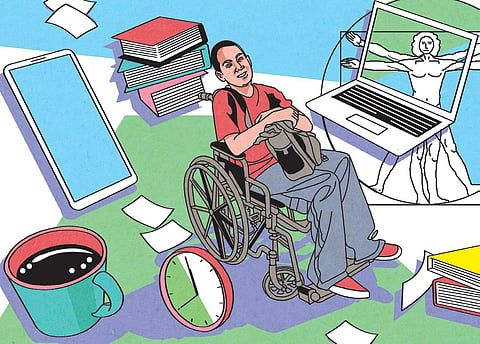

A society can be judged by how it treats its lesser fortunate members. Though the Right to Education Act (RTE) made baby steps in catering to the needs of special children and those with disabilities, there is
a massive gap between theory and practice. The condition of children with disorders like autism, ADHD, dyslexia, duplication syndrome etc., which are often insensitively referred to in common parlance as mental retardation, needs the urgent intervention of the government both at Central and state levels. Every year, around 30,000 to 35,000 children are estimated to be born in India with Down Syndrome. Despite this, social acceptance is hard.
Unless you have a family member with such disabilities or are acquainted with any friends who are parents to such children, it is almost impossible to understand, let alone empathise with, the struggles they go through. One can see how they are excluded from playgrounds and other public spaces. Rarely are these children invited to birthday parties or picnics. The social stigma associated with Down Syndrome is heartbreaking, but should not come as a surprise in a society that is least inclusive as ours. How many community spaces are friendly to the blind or the wheelchair-bound?
Most private schools refuse to admit children with such conditions, despite the RTE Act, and the only option is to resort to the National Institute of Open Schooling. Recently, the Supreme Court directed the government to notify the norms and standards of pupil-teacher ratio (PTR) for special and general schools, and an amendment to the RTE Act has been proposed. According to it, schools must appoint one special education teacher for every 10 children with disabilities studying in classes I to V and 15 children with disabilities studying in VI to VIII, which will help in their inclusion in the mainstream educational ecosystem. Though this move is laudable, in a country where many private schools get away with refusing admission to special needs children, how much of the above will be implemented is to be seen. It needs to be made mandatory that every private school has a compulsory quota of students with disabilities and teachers to cater for their needs, as per the Supreme Court directive.
Children with disabilities are a part of society and should not be shunted to special schools. How will other children learn about empathy and inclusiveness if they remain insulated from the realities of the world? And why should a disabled child be denied the opportunity to play, learn and grow with peers? Anxiety, stress and depression are common among children with conditions like autism, dyslexia etc., and it is inhuman to isolate them.
One of the biggest challenges such children and their parents face is the curriculum and examination pattern, especially for Class X. How will a child of a mental age of five or six years deal with subjects like business studies and economics? What will be the practical value of such subjects for these children who may have to opt for vocational training after school? There should be a separate board for children with special needs, which will conduct examinations and valuation. The syllabus should be curated to their needs. Until such a board is formed, the curriculum of special needs children needs to be reduced considerably.
As of now, there are a few concessions granted by the CBSE board and various state boards, like the use of a scribe and extra time for completing examinations for special needs children. There is no provision, however, for lab assistants in practical examinations. Instead of forcing a dyslexic child to write descriptive answers, objective answers could be a way forward. The method of assessing a student through an examination itself is outdated. The assessment, at least for such students, should be continuous and based on their project work and skills.
The aim of education of specially-abled children is not to prepare them for competitive exams, but to prepare them for life. The social stigma attached to Down Syndrome and its many variants needs to be addressed on a war footing. If a society cannot ensure fundamental human rights to its members,
it doesn’t deserve to call itself civilised. Parents will not be around forever, and these children, when they become adults, should be able to lead a self-dependent life of dignity.
Anand Neelakantan
Author of Asura, Ajaya series, Vanara and Bahubali trilogy
mail@asura.co.in